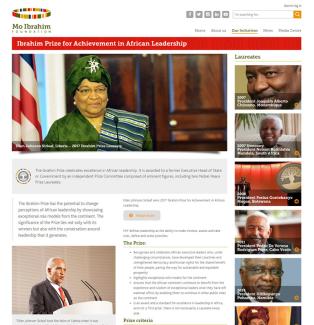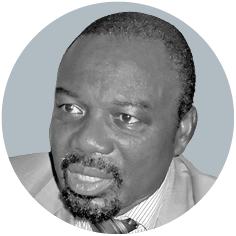Awards
An unconvincing choice

The Mo Ibrahim Prize is a $ 5 million award paid over ten years. After those ten years, the Mo Ibrahim Foundation pays the laureate a further annual $ 200,000 for the rest of her life. The prize is meant to encourage good governance. The criteria are clear. The awardee must have:
- served as an African country’s head of state or government,
- left office in the last three years,
- won office in democratic elections,
- served the constitutionally mandated term and
- demonstrated exceptional leadership.
It should be easy to predict winners, but it is actually quite difficult. The Mo Ibrahim Prize is not awarded every year. The Prize Committee has pointed out this time it is meant to be “a standard for excellence in leadership in Africa, and not a ‘first prize’”. In other words, it is not designed to reward the best statesperson who recently left office.
Sadly, there are serious reasons to doubt Johnson Sirleaf’s “excellence in leadership”. Many Liberians would point out that she was involved in Liberia’s obnoxious decade-long civil war, siding with Charles Taylor, the warlord who was sentenced to life-long prison by a UN court.
What happened after the war, however, matters much more. Johnson Sirleaf took office in a typical post-war situation. Economy and infrastructure were ruined. Institutions were dysfunctional. Security was fragile and society undisciplined. The Ebola pandemic of 2013 – 2016 made everything worse. The truth is that Liberia remains a traumatised and desperately poor country. Corruption is widespread, and people have little trust in the rule of law.
Unfortunately, Johnson Sirleaf’s democracy track record is not speckles. In 2011, Johnson Sirleaf ran for a second presidential term even though she had previously promised to stay a one-term president. She set a destructive precedent, as several African heads of state have been introducing constitutional change in order to allow them several terms. A few days before the election date, she was awarded the Nobel Peace Prize. She declared it was a mere coincidence, but her opponent Winston Tubman argued that it boosted her chances of winning. Moreover, there were complaints of ballot stuffing and rigged electoral roles. Nonetheless, the president did not win 50 % of the votes in the first round, and Tubman dropped out of the run-off election, so Johnson Sirleaf was confirmed in office with 90 % of the votes.
At the time, Samwar Fallah, a Liberian journalist wrote in D+C/E+Z (issue 2011/12, p. 480): “Her high share of votes does reflect the real support the opposition enjoys in Liberia.” Indeed, the event now looks like an unfortunate prequel of recent events in Kenya (see comment in E+Z/D+C 2018/03, p. 12).
The Mo Ibrahim Prize is awarded by an independent committee. Its chairman Salim Ahmed Salim has acknowledged that things are less than perfect in Liberia. He has praised Johnson Sirleaf for assuming responsibility at a time of crisis and working “tirelessly on behalf of the people”. He went on to admit that “such a journey cannot be without some shortcomings and, today, Liberia continues to face many challenges”. His point was that she laid the foundations on which Liberia can now build.
To a considerable extent, the prize committee has rewarded Johnson Sirleaf not for excellent results, but for assuming responsibility in extraordinary difficult circumstances. While this is not entirely without merit, it does downgrade the idea that excellent leadership results in good governance.
Africa needs better governance, and the Mo Ibrahim Prize should encourage it – and it should not only reward top leaders for doing so. Apparently the prize committee struggles to find suitable ex-presidents and ex-prime ministers. Rather than occasionally rewarding a former head of state who have mixed credentials with huge sums, it should regularly award lower-level leaders who have convincing track records, perhaps with more moderate sums (see my essay in D+C/E+Z e-Paper 2017/12, p. 24).
Vladimir Antwi-Danso is the dean and director of academic affairs at the Ghana Armed Forces Command & Staff College (GAFCSC) in Accra.
vladanso@yahoo.com











